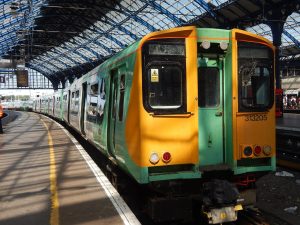Eleanor Akers, founder and Director of Sustainability and Strategy Consultancy Innovative Energy Consultants, is a passionate advocate for sustainable travel. Here, Eleanor, pictured above, talks about the opportunity for economic, social and environmental wins that investing in Britain’s railways could represent for the incoming Labour government
 I love travelling by train, in fact, I am writing this piece on the 9:25 am CrossCountry service from Manchester to Bournemouth. As well as being able to crack on with some work, taking the train aligns with my personal and professional goals of supporting decarbonisation as well as occasionally allowing conversations with strangers. On one train journey, I swapped a slice of cake for half a coffee and gained a Strava friend for life.
I love travelling by train, in fact, I am writing this piece on the 9:25 am CrossCountry service from Manchester to Bournemouth. As well as being able to crack on with some work, taking the train aligns with my personal and professional goals of supporting decarbonisation as well as occasionally allowing conversations with strangers. On one train journey, I swapped a slice of cake for half a coffee and gained a Strava friend for life.
It’s not always an easy choice though. Even for a committed environmentalist like me choosing the 20-minute cycle to Manchester Oxford Road, the hassle and stress of loading my bike onto the train, the hour on the train and the 30-minute cycle to my client’s office in Chester last week seemed like a less than smart choice when compared to the convenience offered by the 45-minute drive door to door. (I still took the train though – I’m stubborn like that.) In this piece, I share my research into why travelling by rail in the UK can be so difficult, my ideas on how Labour could improve the system and the opportunities this would create for the country.
Network Issues
Rail connections between the East and the West are notoriously poor in the UK, as evidenced by my winding one-hour journey to cover the 33 miles between Manchester and Chester last week. It takes 34 minutes to cover the exact same distance between Manchester and Stoke as this is on the mainline to London.
I should caveat this with, it takes 34 minutes when Avanti is operating to schedule, something it doesn’t often do. Earlier this year, The Financial Times reported that 75% of trains between London and Manchester are late and nearly 17% are cancelled or over 30 minutes late, compared to a national average of 4.6%. It’s gotten so bad that I now book trains to arrive in London two hours before I need to be there to ensure there’s time for the train to be late leaving Manchester, be held outside a station en route for at least 45 minutes and make sure I still have time for a coffee at Euston as the onboard coffee machine doesn’t always work.
What Can Labour Do?
Here are five things that the incoming government could do to reform and modernise our railways.
- Increase capacity with new lines, whilst rail operations are privatised, the underlying infrastructure is under public ownership. Labour should invest in building more lines to increase capacity, perhaps reviving plans for the new line connecting Hull, Leeds, Bradford and Liverpool. Having parallel lines, as is the case between Birmingham and London, allows both express services and stopping services to run.
- Reform operator payments, the last government changed the way private operators make a profit: instead of buying a franchise and taking on all the revenue risks of cancellations and delays, operators are now paid a fixed fee by the government and awarded performance bonuses for achieving a measly 70% of performance goals. This means there is little incentive for operators to offer better services, they get paid regardless.
- End contracts with poor-performing operators and bring rail lines into public ownership. This can be done and has been done. In 2015, the East Coast mainline, then the only publicly owned line in the UK, generated over £1 billion in profit for the Treasury and had record levels of customer satisfaction.
- Cap ticket prices to make the sustainable choice the economic choice for people across the country. Our research has shown that average intercity journeys are 3.5 times more expensive by rail than by car.
- Protect staff, disruption has been caused by rail staff striking to protest unsafe working conditions and job cuts. Transpennine Express and Avanti staff report that these operators rely on drivers working on their rest days to run scheduled services. Labour can prevent future strikes by working with unions and operators to implement safe, fair working practices.
These things will require focus, time and money. Here’s why I think Labour should make that investment.
The Economic Opportunity
Research by Oxford Economics shows that every £1 spent on the rail network delivers £2.50 to the wider economy. In addition to jobs created by the rail industry and its supply chain, on-station retail and its suppliers generate revenue. Perhaps more importantly, a safe reliable service opens up opportunities to businesses and individuals nationwide, powering innovation and opportunity.
Social Benefits
In addition to access to jobs, railways increase access to public services and social opportunities. The Borders Railway opened in 2015, bringing tourism and more importantly, affordable housing to the region. Access to transport powers social mobility.
Environmental Leadership
The UK was one of the first countries to commit to a legally binding Net Zero by 2050 target. To achieve this we will need to drastically reduce emissions from transport. In 2021, over 50 million tonnes of carbon dioxide were emitted by private vehicles and taxis. Improving rail links will create a viable alternative to driving that doesn’t cut individuals and businesses off from opportunities. To maintain our global standing as a net zero leader, we need to walk the walk as well as talk the talk and improving rail infrastructure is Labour’s biggest opportunity to do so.
What Can Business Do?
Make your voices heard by writing to your local MP and sharing your business’ concerns with membership organisations like Chambers of Commerce and industry bodies. Actions speak even louder than words: show your business’s commitment to sustainable travel. To find out how your business can make sustainable travel choices easier for your employees and stakeholders, book a free consultation with me or contact me on LinkedIn.


